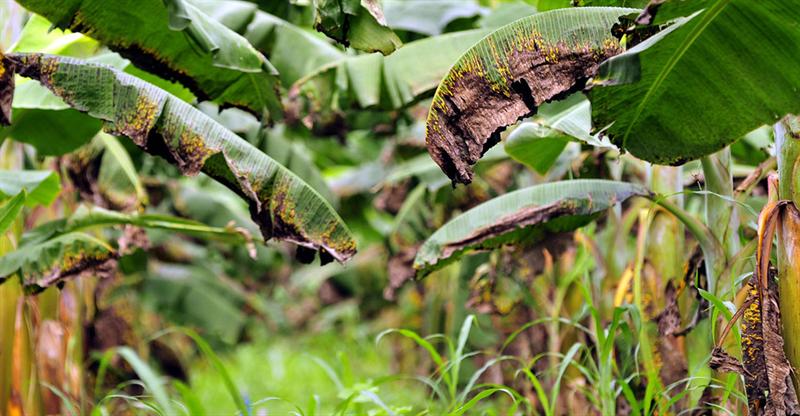BSD reduces the leaf surface area of plants which affects their photosynthetic ability, leading to a reduction in the size and weight of the fruit.
 The Caribbean Agricultural Research and Development Institute (CARDI) in collaboration with the Caribbean Development Bank (CDB) will be hosting a workshop on the “Integrated Disease Management of Black Sigatoka Disease (BSD)” from Aug. 4 - 13, in St. Lucia.
The Caribbean Agricultural Research and Development Institute (CARDI) in collaboration with the Caribbean Development Bank (CDB) will be hosting a workshop on the “Integrated Disease Management of Black Sigatoka Disease (BSD)” from Aug. 4 - 13, in St. Lucia.
The training workshop is seeking to strengthen the capacity of BSD management teams within the Ministry of Agriculture and banana and plantain organisations, extension officers and farmers.
Plant pathologist, Dr. Robert Power from Suriname will facilitate the workshop.
A combination of classroom, laboratory and field sessions will be utilized to deliver a dynamic program to participants. It will focus on the phyto-pathological cycle of the disease, epidemiology, integrated disease management, climatic forecasting methods and measuring disease intensity with a view towards developing and sustaining robust detection, monitoring, and management strategies for Saint Lucia. The sessions will be conducted at the National Fair Trade Office in La Caye, Dennery at 9 a.m.
BSD is a fungal-borne disease which is a main constraint to banana and plantain production. Approximately 97 percent of all banana and plantain varieties grown in the Caribbean are susceptible to BSD. The disease was first detected in the region in 1991, and by 2012 it was recorded in all the banana and plantain producing countries in the Caribbean, where it has been responsible for a drastic decline in production. BSD reduces the leaf surface area of the plants which in turn affects their photosynthetic ability, consequently leading to a reduction in the size and weight of the fruit and bunches by as much as 35 to 50 percent, early and uneven ripening of the fruits and poor ratooning (sprouting) of the stools (stumps).
The workshop is one of three initiatives taking place under the CARDI/CDB funded project: the "Development of an Integrated Disease Management Program for Black Sigatoka Disease” in Guyana, Dominica, Saint Vincent and the Grenadines and Saint Lucia. The other two are the development of an integrated disease management (IDM) plan for BSD and the introduction and evaluation of BSD tolerant varieties. It is envisioned that these three actions will work synergistically to significantly improve disease management, resulting in higher yields for farmers.
Bananas are an important commodity for the region’s small farmers as it is a source of employment, income and food security. Banana and plantain exports also account for approximately one third of the export earnings from the Windward Islands.